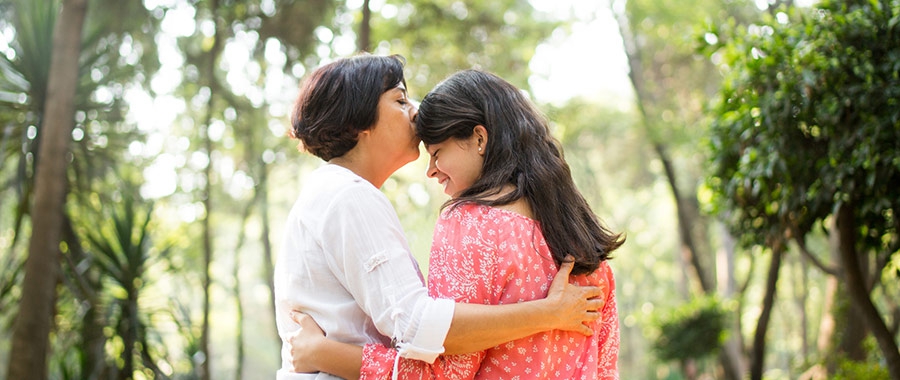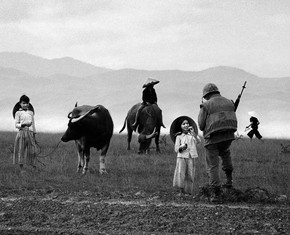The views expressed in our content reflect individual perspectives and do not represent the authoritative views of the Baha'i Faith.
When I was a young girl, my family outwardly seemed to have unity—even though my stepfather molested me and beat my mother.
I did not publicly talk about what was happening to me. My family had pancake breakfasts on the weekends, and my mother taught me how to crochet, and my brother and I caught bullheads down at the stream, and my stepfather took us all out for ice cream. From everyone else’s perspective, we seemed normal, happy and united.
We did things together, but we were not unified. My stepfather touched me, and physically abused my mother. Does that sound like unity just because I didn’t say anything that questioned what was going on? No. Of course not.
We did all the things a family does: we ate dinner together, we went camping, we went shopping, we played, and sang, and spent time together. Underneath the surface, though, we secretly despised how we felt around each other: scared, angry, spiteful, injured, resentful, vengeful and hateful.
We did not have unity, because I had no voice. I had no power. My mother and my siblings had no voice and no power. My stepfather had it all—and yet, he didn’t have any of it.
He didn’t have it because he couldn’t talk about his own demons and fears, or understand his anger and his rage. He acted out, powerless to stop himself. It was a cycle. None of us could talk, so none of us had a voice. None of us could stop it, and so none of us had any power. We lived that way until my mother left him, when she finally found her power and her voice.
Now she’s learned to be powerful, and so have I. Sometimes that intimidates others and suppresses their voices, because they want to preserve unity. But there is no unity with no voice. There is no unity without power. There is no unity unless everyone can speak, just as there is no unity without love and without acceptance.
In short , I don’t hate you, I hate the me that I am around you: voiceless, powerless, defensive, angry, hurt, resentful, and vengeful. I don’t like those qualities about me, and I don’t enjoy spending time with anyone who brings them out in me.
But unity is about being connected, united, and accepting. Unity means liking ourselves. It’s about living in a world where we don’t have to be afraid, and we don’t have to worry about having things taken from us. Unity means being important to each other, and talking and listening and sharing and living.
I want to like the person I am around you. I want to like me all the time. Which is why it’s hard to hear about those times when I hurt you or made you feel powerless and voiceless. But I need to. I want to. I can’t learn and grow and change if I don’t know about the times that I have hurt you.
By not telling me, you are giving away your voice and your power. Please don’t do that just to spare my feelings. Because at some point, you won’t like you around me, and then you’ll choose to go away.
In the Baha’i teachings, we have a quote that I try to live by:
Be generous in prosperity, and thankful in adversity. Be worthy of the trust of thy neighbor, and look upon him with a bright and friendly face. Be a treasure to the poor, an admonisher to the rich, an answerer of the cry of the needy, a preserver of the sanctity of thy pledge. Be fair in thy judgment, and guarded in thy speech. Be unjust to no man, and show all meekness to all men. Be as a lamp unto them that walk in darkness, a joy to the sorrowful, a sea for the thirsty, a haven for the distressed, an upholder and defender of the victim of oppression. Let integrity and uprightness distinguish all thine acts. Be a home for the stranger, a balm to the suffering, a tower of strength for the fugitive. Be eyes to the blind, and a guiding light unto the feet of the erring. Be an ornament to the countenance of truth, a crown to the brow of fidelity, a pillar of the temple of righteousness, a breath of life to the body of mankind, an ensign of the hosts of justice, a luminary above the horizon of virtue, a dew to the soil of the human heart, an ark on the ocean of knowledge, a sun in the heaven of bounty, a gem on the diadem of wisdom, a shining light in the firmament of thy generation, a fruit upon the tree of humility. – Baha’u’llah, Gleanings from the Writings of Baha’u’llah, p. 285.
I don’t want your voice, I don’ t want your power. I give them back to you to use. I want unity. I want friendship. I want to live in a world where you can honestly tell me that I made a mistake, and I can fix it, and I can tell you the same. I want freedom, and freedom only comes from unity.
If we all agreed to speak up, we could use words that could help someone grow—and hear words that help us grow, too. When you plant a seed, you have to bury it in the soil and water it so that it can grow. If you were so worried about crushing the seed from the weight of the soil that you didn’t plant it, it couldn’t grow. If you were so worried about drowning the seedling that you didn’t water it, it couldn’t grow.
Unity works the same way. To build true unity we have to find our voice and our power to use it. If others around us cannot find theirs, then we must share ours with them until they too feel empowered and safe enough to speak.
















Comments
Sign in or create an account
Continue with Googleor